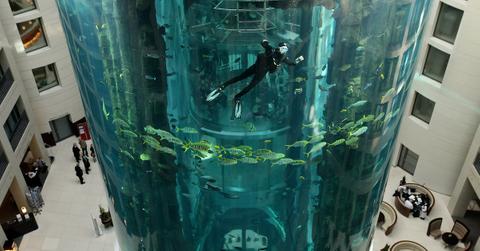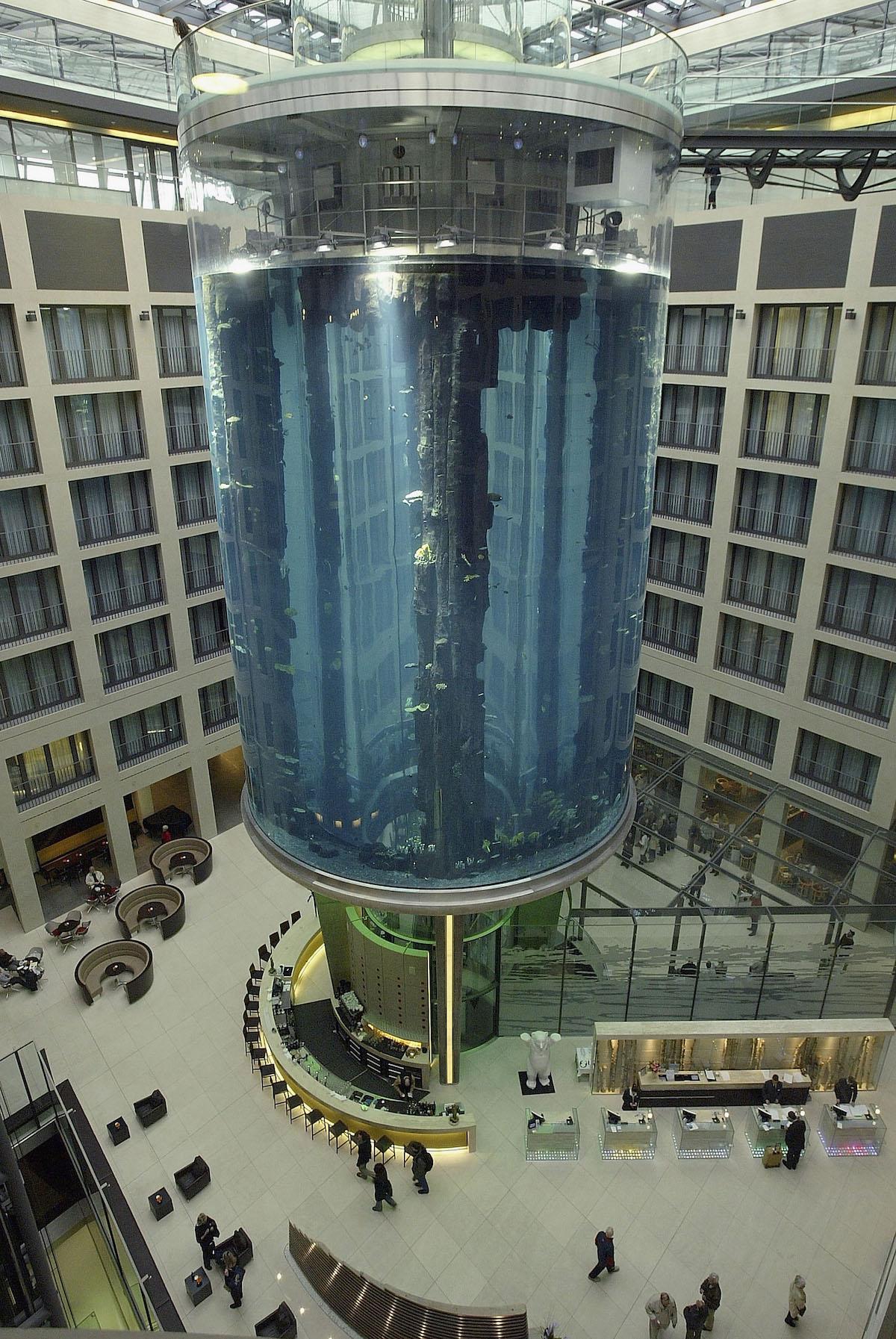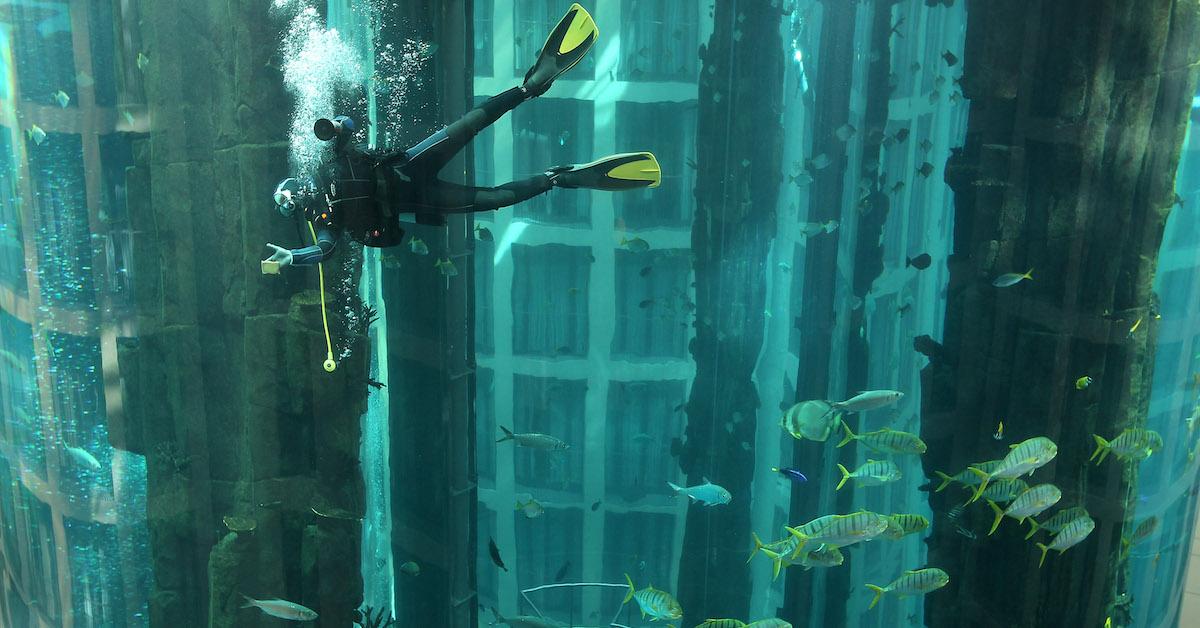Massive Aquarium in Berlin Bursts, Killing 1,500 Tropical Fish: Everything You Need to Know
Published Dec. 16 2022, 11:38 a.m. ET

A diver cleans the glass the AquaDom on March 22, 2010 in Berlin, Germany.
Pour one out for the fishies… literally.
In Berlin, a massive aquarium tank known as the AquaDom exploded, expelling thousands of tropical fish, hundreds of thousands of gallons of water, and broken glass throughout the hotel and onto the street.
But why did this happen? Keep reading for all the details on this incident, which, as we approach three years of the COVID-19 pandemic, is yet another reminder of why humans should stop exploiting animals.

Fish are seen swimming in the AquaDom & Sea Life Centre, May 13, 2004 in Berlin, Germany.
What happened with the AquaDom aquarium in Berlin? The explosion has led to serious damage.
The Radisson Blu hotel in Berlin, Germany is home to the AquaDom fish tank, which opened in 2003, and was once awarded a Guinness World Record for being the biggest cylindrical aquarium on Earth.
But maybe that was a designation that the world wasn’t ready for, because something went wrong early in the morning of Friday, Dec. 16, 2022, when the tank suddenly burst just before 6 a.m. local time.
The AquaDom, which was 82 feet tall and contained a whopping 1 million liters (264,000 gallons) of water, suddenly exploded, blasting all of its contents through the tank’s glass, as per AP News. On top of the infinite water that began flooding, broken glass went everywhere. Additionally, the 1,500 tropical fish who inhabited the AquaDom were also ejected from the tank; they represented more than 100 different fish species.
The immense amount of water could not be contained, and as it flooded the hotel, it burst through the lobby and onto the street in front of the building — and it brought with it many fish, broken glass, and various items from the hotel, via The New York Times. Reports and photos of the aftermath show large potted plants, lamps, luggage carts, and other debris littering the street in front of the Radisson Blu.
The incident also caused a blackout throughout the building, and all guests are being relocated.
Did the Berlin aquarium fish die?
Berlin Mayor Franziska Giffey stated that “Unfortunately, none of the 1,500 fish could be saved,” via AP News. The New York Times added that some Radisson Blu guests said the street was covered with dying and dead fish, who “appeared to have frozen to death by the frigid morning temperatures of 19 degrees Fahrenheit.” However, it also stands to reason that some of the fish likely suffocated to death from simply being out of the water.
Because of the power outage, fish in other tanks throughout the building (which is connected to Sea Life Berlin, which has temporarily closed) are at risk. Berlin Senate official Markus Kamrad stated that people are working to repair the electricity, and/or bring the fish to one of various places that already offered to rescue them, according to The New York Times.
Did the AquaDom aquarium collapse kill anyone at the Radisson Blu?
No humans were killed in the incident, though two people sustained injuries from broken glass, and were taken to the hospital, as reported by The New York Times. And BBC News reported that Berlin's fire service sent over 100 firefighters to the scene, as well as a team of rescue dogs to look for any human bodies; they fortunately did not find anyone.
Giffey described the incident as a “veritable tsunami,” but added that “Despite all the destruction, we were still very lucky,” via AP News, since the explosion happened so early in the morning, before too many people were up and about.

A diver cleans the glass of a giant, cylindrical aquarium as fish swim by at the AquaDom on March 22, 2010 in Berlin, Germany.
Why did the AquaDom explode?
Berlin’s fire service stated that the cause of the incident is not clear; and local news outlets reported that the Berlin police have not found any evidence of an attack, as per BBC News.
However, The Guardian reported that some people were speculating that freezing overnight temperatures may have caused the AquaDom’s glass to crack.
It’s tragic that this accident has caused so much destruction, from human injuries to structural damage to the death of thousands of innocent fish — all because of humanity’s greed for using animals as entertainment.
COVID-19 is believed to be a zoonotic disease, meaning it originated in animals. Many experts have stated that humans must reduce the exploitation of wild animals in order to prevent future pandemics, and one would hope that the last few years of living through a pandemic has actually inspired people to listen.
There is no necessity to take fish from our overfished oceans and put them on display for humans, especially considering how advanced technology is these days — in fact, a circus in Germany is using hologram animals instead of real animals. Hopefully instead of reconstructing the AquaDom, its operators will consider replacing it with something that does not exploit live animals